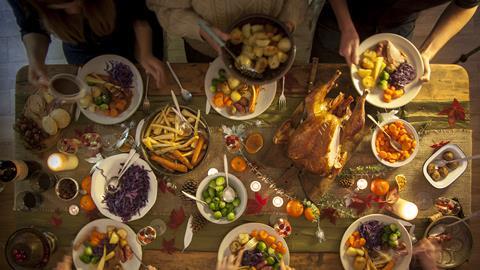Research by Veg Power shows worrying downward trend in veg consumption among the less well off
Lower-income families are buying fewer vegetables in favour of unhealthy alternatives, new reserach reveals.
The latest market insight report by Veg Power paints a concerning picture of consumption trends as spiralling living costs impact consumer buying behaviour.
Examining purchases over the Christmas period, the report found that families on lower incomes reduced their spend on vegetables - and on food generally - and prioritised purchases including alcohol, sweets and treats.
The YouGov survey of 1,836 people found that 28 per cent of families with a combined household income of £30,000 or less strongly agreed that they spent less on food this Christmas compared to previous years.
Of those peopole, nearly a third (29 per cent) shopped more at discounters, 23 per cent said their food choices were dictated by offers, promotions and discounts, and nearly half (45 per cent) spent less on going out over Christmas than in previous years.
Declining veg consumption
Vegetable consumption habits were also impacted in these families, with 28 per cent agreeing that energy costs led to less veg consumption, 20 per cent agreeing that veg purchasing was reduced to save money, and 20 per cent buying food treats for the family instead of veg, due to limited budgets.
The findings were supported by analysis of IRI Worldwide retail sales data, which found that over the three weeks of Christmas the nation’s Christmas shopping baskets have become considerably less healthy over time. Compared to 2018, veg’s volume share was 7.6 per cent lower, while sweets and snacks generated 5.7 per cent higher volume and alcohol’s share was up by 10 per cent.
The findings are even more dramatic in terms of value sales, with shoppers’ share of spend on veg nearly 18 per cent lower last Christmas compared to 2018.
Veg Power chief executive Dan Parker said: “An economist will tell you that vegetables are cheap, with lower than market inflation. A nutritionist will tell you that when measured in terms of cost per calorie, vegetables are expensive. At Veg Power our expertise is behaviour change, and our analysis is that lower-income family shoppers don’t think in either of these terms.
”They think in terms of risk: Will the food item be eaten? Will it cause friction and stress? When people have strain on budgets, then any food wasted is unacceptable. The key to keeping healthy food in lower-income baskets is not simply lower prices, it is giving parents greater confidence that the food will be eaten.
”We are supporting families with initiatives like Simply Veg, which offers simple, easy ideas from an impressive panel of experts to help reduce the impact on families’ budgets, encourage veg acceptance by children and decrease the amount of food waste.”




